Following an outpouring of criticism in Iran of an emergency permit being issued for the country’s first domestic Covid-19 vaccine, CovIran-Barekat, Kianoush Jahanpour, a spokesman for Iran’s Food and Drug Administration, has called the critics “jerks”.
The ex-Health Ministry spokeman’s unprofessional outburst came after news also broke that CovIran-Barekat would cost three times as much as imported vaccines. This did not sit well with officials in the Health Ministry either.
Jahanpour also tried to deny reports about the price of the first Iranian-made vaccine, which is being produced by a subsidiary of Executive Headquarters of Imam’s Directive, a massive parastatal conglomerate under the control of Supreme Leader Ali Khamenei.
But less than 24 hours later, Mohammad Reza Shanehsaz, Jahanpour’s own boss at the Food and Drug Administration, confirmed the reports, adding that the government would buy this vaccine at 200,000 tomans (more than US$8 at open market prices and close to $49 at the official Iranian exchange rate) per dose from the Headquarters, also known as Setad.
The pace of vaccination with imported vaccines is still sluggish as Iran squares up to the possibility of a fourth wave of infections in its ongoing battle with coronavirus. Iranians aged over 70 are still unsure when they will be fully inoculated, with millions left waiting for their second dose after stocks dried up.
Iran’s deputy health minister for research has also warned against the “hasty” decision to deploy the domestic vaccine. But the office of the Supreme Leader has confirmed the rollout of CovIran-Barekat will take place, and in a publicity stunt designed to silence critics, the 82-year-old Khamenei was pictured supposedly receiving the Iranian-made jab on Sunday.
Is CovIran-Barekat for Real?
The emergency permit issued to CovIran-Barekat raised a number of questions. Last week IranWire’s Farsi team interviewed a doctor of pharmacology who works for one of the biggest pharmaceutical companies in Iran, who said: “I can tell you with confidence that there is no such thing as CovIran-Barekat vaccine.
“The Islamic Republic is probably offering another vaccine under its own brand... [One possibility] is that the Health Ministry, hand in hand with the Food and Drug Administration, has purchased and imported the cell stock for development of another vaccine.
“The second possibility that the cell stock in the joint vaccine being developed with Cuba has been used for making CovIran-Barekat. It must be noted that another company in addition to the Pasteur Institute is working with the Cuban company, and CovIran-Barekat might use doses of this vaccine.”
The third possibility, he said, also involved the joint development of a vaccine. The most likely scenario was the use of cell stock from joint development with the Russian creators of Sputnik V for CovIran-Barekat.
The report immediately drew the ire of Hojjat Niki Maleki, head of Setad’s public relations. Without responding to the specific points raised, he quoted a single sentence and tweeted: “Until yesterday they said the Barekat vaccine is dangerous and must not be used. Today they say it is OK because the Islamic Republic is offering another vaccine under Barekat’s brand.”
Setad has steadfastly refused to divulge specific data about clinical trials of its vaccine on human subjects. Earlier, there had been objections to the results published from the animal testing phase. But they went ignored by Setad and within a week an emergency permit was issued for the vaccine.
Officials of the Islamic Republic have repeatedly said they do not need a permit from international organizations such as the World Health Organization (WHO) to put a domestic vaccine to use.
The CovIran-Barekat Price Controversy
On June 22, Iranian media reported that CovIran-Barekat had been priced at 200,000 tomans, over $8 on the open market exchange rate, while imported vaccines such as AstraZeneca currently cost less than $3.
This led to public outcry – and to Kianoush Jahanpour’s branding of the critics as “jerks”. In his rebuttal to his own team member, the Food and Drug Administration’s Mohammad Reza Shanehsaz confirmed the 200,000-toman price tag but insisted that when calculated based on rates set by the Iranian state-run online currency exchange, Nima, it cost less.
Meanwhile Alireza Vahabzadeh, an advisor to the first health minister, said that based on Nima’s rates the vaccine ought to cost $5.70 per dose: 70 percent cheaper, he claimed, than the average cost of a foreign vaccine.
He justified the price by saying: “If we didn’t make this, we’d have to wait in a long line to buy vaccines [from foreign countries]. But it would have cost Iran millions of dollars as well. Of course, people don’t have to pay anything for this vaccine.”
In other words, Iranian officials have played on vastly different exchange rates – the official one, the open market rate, and the artificial values listed on the online exchange they control – to “prove” the cost of Setad’s jab is not unreasonably high. On the other hand, of course, if the allegations about rebranding are true, they would also be making a nifty profit.
Ali Khamenei Pushes Iran’s First Domestic Vaccine
Widespread disquiet over the licensing of CovIran-Barekat has also prompted Supreme Leader Ali Khamenei to intervene. Last week it was abruptly announced that Ayatollah Khamenei would be inoculated with the domestic vaccine himself.
During the third wave of coronavirus infections in Iran, on January 8 this year, the Supreme Leader banned the importation of US and UK-made Covid-19 vaccines, saying the two countries were not “trustworthy”.
In justifying his decision, Khamenei said: “A few days ago, there were 4,000 deaths in their country [the US] in one day. If they know how to make a vaccine, and if their Pfizer factory knows how to produce one, they can use it for themselves so that there won’t be so many deaths there.”
Last week’s announcement had the desired effect. Immediately after the “revelation” that Khamenei would be injected with CovIran-Barekat, Iranian officials fell over themselves to support the rollout.
“The Barekat vaccine has thoroughly completed phase 3 of clinical trials and received an emergency permit from the health ministry,” tweeted the MP Zohreh Elahian. “Of course, foreign vaccines have received emergency permits as well, but the difference is that the Health Ministry and the Food and Drug Administration have received the data about [clinical trials of] Barekat, whereas we do not have this data about imported vaccines.”
This, of course, was a bare-faced lie; the manufacturers of Covid-19 vaccines have been obligated to share the results of clinical trials, although the raw data for Sputnik V is not yet available.
Conversely, however, Farid Najafi, deputy health minister for research and technology, broke rank to express concern about the emergency permit being issued for CovIran-Barekat. “The National Ethics Committee has warned that issuing an emergency permit for a vaccine that has not completed phase 3 is a momentous decision,” he wrote in a letter to Health Minister Saeed Namaki, “and it can only be issued for Barekat, Pasteur and other vaccines [without completing phase 3] if there are no usable vaccines in the country.” To issue an emergency permit, he added, information about “the consequences of its being ineffective” must be “transparently be made available to the public.”
Earlier this year Najafi was appointed the successor to Reza Malekzadeh, the previous deputy minister for research, who resigned in November 2020 in protest against Namaki’s actions.
In his letter of resignation to Namaki, Malekzadeh had described the health minister’s actions in dealing with the pandemic as “hasty”, “contradictory” and “very wrong”. He described the launch of an Iranian-made vaccine as a “circus”, adding of CovIran-Barekat: “Statements made by your excellency regarding the development of the Iranian vaccine which is still in the early phases of development were unscientific and hasty.”
The research division also drafted an 88-point list of criticisms of the Iranian state’s handling of the pandemic, reproduced in full at the close of IranWire’s comprehensive report on coronavirus in Iran last year. It included an unscientific approach and scientists’ lack of access to useable data on Covid-19.
In his response, and when appointing Farid Najafi as his new deputy for research, Namaki had written: “Previous ignorant drivel must not be repeated.” The question now is whether Namaki will classify Najafi’s warning as “ignorant drivel” as well.
Official Coronavirus Statistics
According to the official statistics announced daily by the health ministry, a total of 854 patients lost their lives to Covid-19 in Iran in the week ending June 24. With 144 deaths, June 24 had the highest number of fatalities for the week.
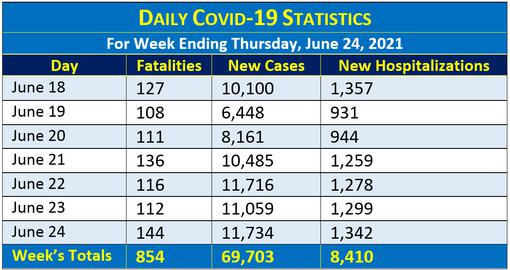
At the week’s end, 3,225 Covid-19 patients were being treated in ICUs. As the figures below show, as of now just 1,069,565 Iranians of a population of more than 82 million have received both doses of vaccine.
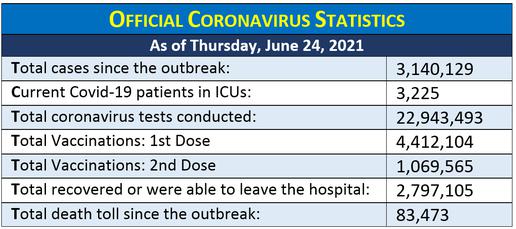
visit the accountability section
In this section of Iran Wire, you can contact the officials and launch your campaign for various problems




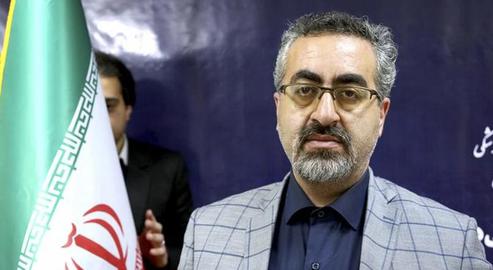
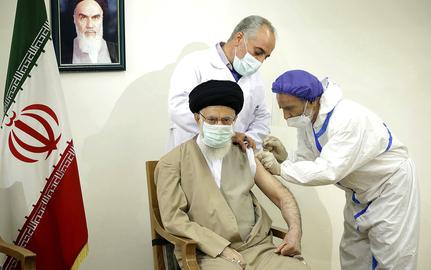
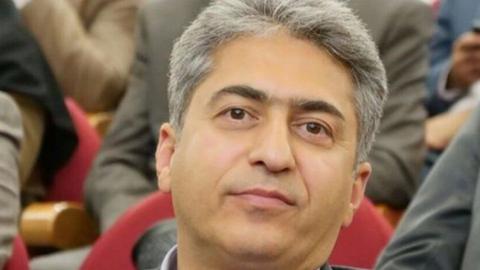




















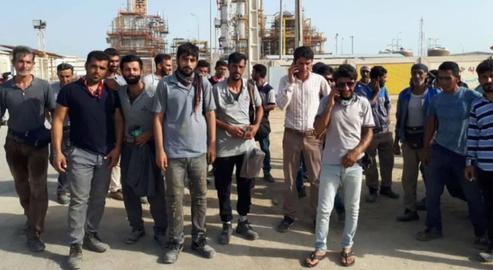
comments